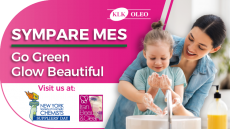The evolution of the Halal trend part III: Mintel presents hijab hair care opportunities

Andrew McDougall, Global Analyst at Mintel, commented in his report, entitled ‘Growing population outpacing products presents opportunity for halal haircare’, that as the Muslim population is set to increase 73% over 2010-2050, this opens up considerable opportunities for halal brands to expand into fairly unexplored market segments.
When compared to the growth rate of the world’s total population, which is expected to be 35%, halal-focused products and brands launching products for hair that is covered by the hijab, have significant capacity to appeal to the global market.
Hijab: A new market?
In recent years, the number of hijab-wearing consumers has risen, along with launches of halal hair products in Muslim countries. However, Mintel has identified one area that, to date, has been overlooked: hair care products that specifically target covered hair.
As the percentage of halal products containing a claim relating to covered hair is low, so too is the marketing and promotion of products targeted to hijab wearers.
The development and launch of products that highlight added care and benefits such as volumising, attention to the scalp and freshness and fragrance should tap into the needs and desires of these target consumers.
Meeting consumer needs
Mintel suggests that leave-in moisturising products and mists that offer freshness and fragrance for the covered hair would be popular with the sector. Dry mousse could also gain traction for its volumising properties, along with dry shampoo. Hair masks or night repair creams that nourish, refresh and rejuvenate the scalp present further opportunities to brands looking to enter or grow within the sector.
Several brands from leading nations have already developed products aimed at the hijab-wearing consumer. The ginseng roots in Indonesia’s Sunsilk Hijab Recharge Lively Strong Hairfall Solution help to thicken and strengthen the hair, while its fragrance release pearls claim to provide all-day freshness to covered hair. Indonesia-based Muslimah by Sophie, formulated with active ingredients, is a mist that also claims to give freshness and fragrance to the hair and hijab.
In Malaysia, a growing space for halal products, Safi Shayla Hair Spa is a halal-certified product that claims to be suitable for all hair types, especially hijab wearers and also contains multivitamins that moisturise the hair.
Product releases such as these are not only within APAC, international players are now expanding their portfolios into the hijab hair care segment. Unilever Indonesia joined forces with US scalp treatment specialist Francesca Fusco in 2015 to launch Sunsilk Clean & Fresh, which aims to nourish the hair and provide a clean and fresh feel to the scalp for hijab wearers.
Entering the mainstream
Availability is high and has been strengthened by mainstream campaigns projecting hijabs. Leading fashion retailer H&M recently used a Muslim model in a hijab for the first time in its Dolce & Gabbana advertising campaign to promote its luxurious range of hijabs and abayas.
Strong marketing campaigns that clearly describe the concept of halal will build awareness of the requirements of halal certification. Ongoing advertisements that continue to feature hijab-wearing women will help to deliver broader messages about a brand/product’s values and positioning.
As Muslim women look beyond ingredients and seek out products that contain the halal certification, there is ample opportunity to develop the halal hair market further.
While typically halal products relate to skin care, colour cosmetics and traditional hair care, Mintel emphasises how product claims highlighting alcohol-free and vegan assurances have generated interest in recent years from consumers that wear the hijab.
Mintel also suggests that now is a key time to focus on developing and launching products that meet non-traditional cosmetics, beauty and personal care. The research company’s Serving the Underserved trend indicates that as we are living in a more ethnically and culturally diverse society, brands should reflect this in their portfolio development.





![HairRevive [MM+Zn], a powerful solution combating hair aging thanks to Musk Mallow and Zinc](/var/wrbm_gb_food_pharma/storage/images/_aliases/news_teaser/publications/cosmetics/cosmeticsdesign-asia.com/product-innovations/hairrevive-mm-zn-a-powerful-solution-combating-hair-aging-thanks-to-musk-mallow-and-zinc/16555616-1-eng-GB/HairRevive-MM-Zn-a-powerful-solution-combating-hair-aging-thanks-to-Musk-Mallow-and-Zinc.jpg)


![Able C&C has furthered its partnership with Japanese discount chain Daiso with new makeup launch. [A'pieu]](/var/wrbm_gb_food_pharma/storage/images/_aliases/wrbm_tiny/publications/cosmetics/cosmeticsdesign-asia.com/headlines/brand-innovation/a-pieu-and-daiso-launch-exclusive-2-makeup-line/17339117-1-eng-GB/A-pieu-and-Daiso-launch-exclusive-2-makeup-line.jpg)
![Down Under Enterprises is setting sights on the Asian market as environmental sustainability and traceability become increasingly important. [Getty Images]](/var/wrbm_gb_food_pharma/storage/images/_aliases/wrbm_tiny/publications/cosmetics/cosmeticsdesign-asia.com/headlines/market-trends/down-under-enterprises-shifts-focus-to-china-as-environmental-sustainability-traceability-come-into-the-spotlight/17304932-1-eng-GB/Down-Under-Enterprises-shifts-focus-to-China-as-environmental-sustainability-traceability-come-into-the-spotlight.jpg)
![News updates from Shiseido, Dr.Ci:Labo, Sephora, and more. [Shiseido]](/var/wrbm_gb_food_pharma/storage/images/_aliases/wrbm_tiny/publications/cosmetics/cosmeticsdesign-asia.com/headlines/brand-innovation/updates-from-shiseido-dr.ci-labo-sephora-and-more/17334944-1-eng-GB/Updates-from-Shiseido-Dr.Ci-Labo-Sephora-and-more.jpg)

![Clariant has underscored the importance of localisation strategies and distribution capabilities in China with beauty trends evolving at a rapid pace. [Getty Images]](/var/wrbm_gb_food_pharma/storage/images/_aliases/wrbm_tiny/publications/cosmetics/cosmeticsdesign-asia.com/article/2024/04/16/clariant-emphasises-importance-of-localisation-in-the-era-of-viral-trends/17327969-1-eng-GB/Clariant-emphasises-importance-of-localisation-in-the-era-of-viral-trends.jpg)

![We dive into our most-read stories on formulation and science. [Getty Images]](/var/wrbm_gb_food_pharma/storage/images/_aliases/wrbm_tiny/publications/cosmetics/cosmeticsdesign-asia.com/headlines/formulation-science/skin-science-latest-stories-on-cosmetics-science-and-formulation/17334719-1-eng-GB/Skin-science-Latest-stories-on-cosmetics-science-and-formulation.jpg)


